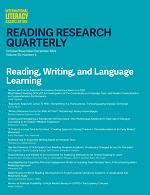Forfattere:
Ellen Irén Brinchmann, Hanne Næss Hjetland & Solveig-Alma Halaas Lyster
Abstract:
The purpose of this study was to explore the hypothesis that teaching students knowledge of word forms and meanings supports the development of decoding and linguistic comprehension, which are fundamental Components of reading comprehension. We examined this hypothesis by investigating the effects of a comprehensive word knowledge intervention on the language and literacy skills of poor readers. The participants included 118 monolingual third- and fourth- grade students from 12 Norwegian elementary schools. A quasi- experimental approach was employed with students in the treatment and control groups matched on grade and reading comprehension level. The intervention was delivered by teachers in small groups for 60 minutes Three times per week over a period of 10 weeks. At the end of the intervention, the treatment group showed significantly greater gains than the control Group on researcher- created and transfer measures of language and a transfer measure of reading comprehension. There were no statistically significant effects of the intervention on two measures of decoding. The results support the hypothesis that comprehensive word knowledge instruction is effective in improving language abilities underpinning reading comprehension. The utility of this approach for improving decoding abilities remains unclear.
